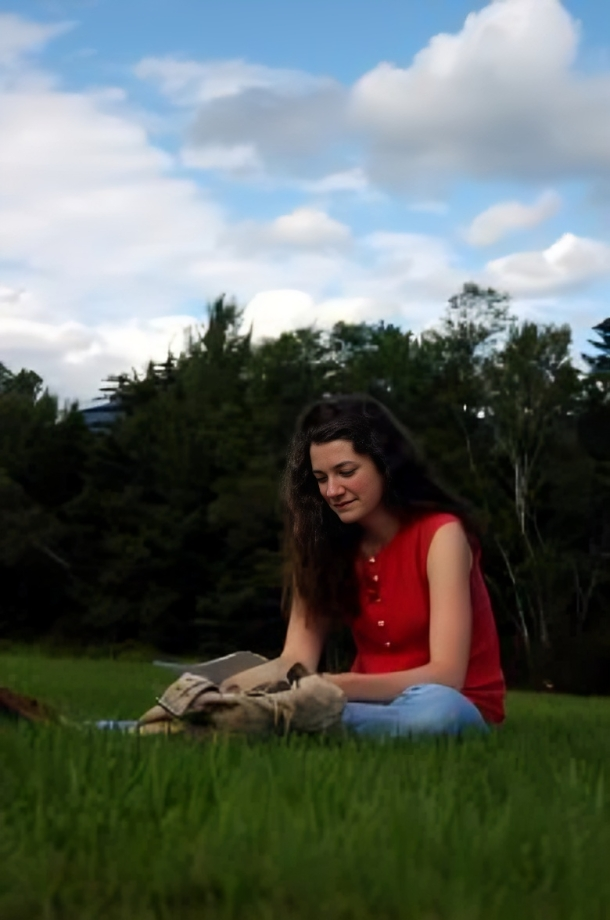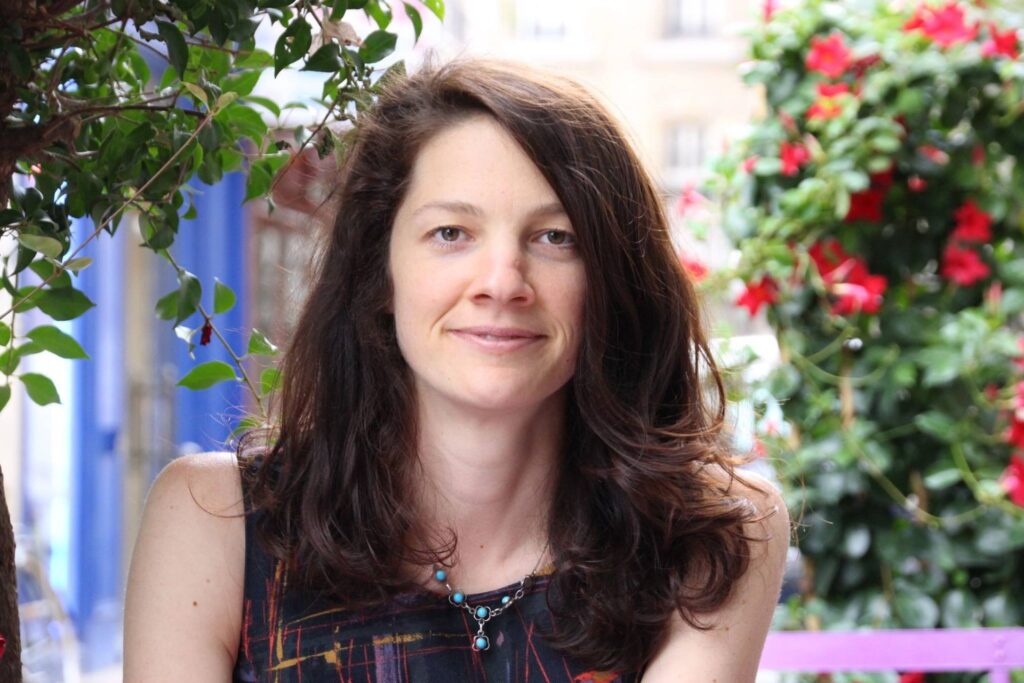Editorial intern Madilynn Maretoli ‘25 talks to writer, scholar, and former NER intern Taylor Johnston-Levy about studying English at Middlebury, pursuing an intellectual life, and the “queer use” of institutions.
Madilynn Maretoli: Where are you now, geographically and professionally?
Taylor Johnston-Levy: Since 2019 I have lived in Tel Aviv—a place I was barely aware of when I was an undergraduate at Middlebury College! I’m located in the north part of the city near a large public green space called Yarkon Park.
Over the past five years, I’ve held postdoctoral fellowships and teaching positions at several different Israeli universities, but I’m currently teaching US literature and creative and academic writing at Bar-Ilan University, in a suburb of Tel Aviv. I’m also finishing an academic book manuscript, on representations of the white lower middle class in contemporary US fiction, and writing my own short stories.
MM: How did you find yourself moving from Vermont to where you are now?
TJL: I remember being in some anguish over where I should live and what I should do at the end of my senior year at Middlebury. I thought I would work in publishing or live abroad for a year and then start an MFA program, and it was very important to me to begin pursuing those aims as directly as I could.
Well, my life over the past 17 (eek!) years has had very little to do with what I imagined for myself as a college senior. I did teach English in Italy for a year, but then I moved to San Francisco—without any real connection to the city and with very little concept of what I might do there beyond having an interesting, perhaps bohemian, experience. Since I’d studied Italian at Middlebury, I ended up working at an Italian immersion preschool for several years. In the process, I learned so much about the intellectual life of children, deepened my knowledge of Italian, and made friends I’ve kept to this day. But at a certain point I was ready to restart my own intellectual life—I longed to sit in the quiet of a library with a large cup of coffee.
It turns out that’s not really what you do as a graduate student at UC Berkeley. My time in the comparative literature PhD program was far more dynamic, consumed by humbling seminar discussions, union meetings, feminist consciousness-raising groups, teaching, and the general hustle of trying to start a career as a humanities academic these days. But I loved it; I couldn’t imagine studying anywhere else. And along the way I picked up an MA in creative writing in the English department, which afforded me some time to work on my fiction.
A couple of years before I finished my dissertation at Berkeley, I met an Israeli theoretical physicist who is now my partner and the father of my one-year-old daughter. So it wouldn’t be inaccurate to say that I followed a man to Israel, and yet I can’t imagine a more meaningful intellectual and professional life than the one I’ve found here. So much for planning!
MM: You just finished a postdoctoral fellowship at Ben-Gurion University of the Negev and are currently a teaching fellow at Bar-Ilan University. What have you learned from these experiences?
TJL: I find it impossible to discuss teaching in Israel without talking about politics as well. Israeli universities are Jewish nationalist institutions. But importantly, they are also what Mary Louise Pratt calls a “contact zone,” meaning a place of encounter for groups who rarely meet, in this case Palestinian and Jewish citizens of Israel. (Even these categories are contested: Arabs who live within the so-called “green line” that borders Israel are often called “Israeli Arabs,” though many identify as Palestinian.) The university classroom is still a place of inequality—and by that, I mean an extension of the power imbalance between Palestinians and Jews within Israeli society. However, the classroom can also become a place for attempting the mutual understanding essential to a future of social justice in Israel.
I’ve come to believe strongly in this “queer use” of institutions, a term I admire coined by Sara Ahmed. She has a great metaphor for “queer use”: like birds who make their nest in a mailbox until they’re thrown out or until the box can no longer perform its intended function, an educator can use the institutional “box” in which they’re squatting as a home for vital social projects. In doing so, they might end up changing, or at least shifting, the function of the institution. Working at Bar-Ilan University and several others here, I’ve learned how to live in such a box and use it for what’s important to me, or at least attempt to do so, with the help of colleagues and students. Thus far, that has involved teaching literature as various as The Merchant of Venice and Richard Wright’s Native Son as a way to start conversations between students about the Israel-Palestine conflict or about social inequalities within the state of Israel. Now, I’m working with students in my department to create a reading group about Palestinian and Jewish literature in English, with the aim of bridging the gap in communication between students of those identities. It’s actually the students’ initiative—I’m just doing what I can to support them.
And what have I learned from being a postdoctoral fellow? Really, how to keep doing my academic and creative writing while I’m busy with everything else I’ve described! Fellowships as supposed to be a time when you dedicate yourself to academic research. But there is no ivory tower anymore—I already learned that at Berkeley when my fantasy of quiet contemplation was (not unhappily) shattered. As I said, working as a writer and an academic is a hustle for my generation, one that likely involves years of work as a contingent faculty member. So you have to push on with your writing and research while looking for the next gig, finding meaning in your teaching, and not knowing exactly how it’s all going to work out. But it has worked out for me so far; even under these conditions, I love my work and have found ways to keep doing it.
MM: What’s one skill you developed as an undergraduate, either in school or via internships, that serves your professional work?

TJL: When I was a student in the Middlebury English department, it was still a place beholden to the practice of close reading. After studying at Berkeley, I’ve become something of a “theory head”—critical theory and critical race theory both underpin my academic work—but because of Middlebury, I’ll always be a close reader at heart. I learned to leave no stone unturned. For me, the fascination of language is the meaning it holds in its smallest auspices, and that fascination serves both my creative and academic writing.
Perhaps a simpler answer to this question is that I learned when to write. I couldn’t write at midnight before a deadline, after having eaten all the junk food in my kitchen trying to distract myself from the deadline. I had to wake up early in the morning, find someplace quiet, and write until I got tired. Every writer needs their own version of that realization, I think. As life gets more complicated, it’s not always easy to keep my ideal hours, but there’s still a muscle memory of times when I was really productive. And that memory allows me to get myself in a chair and write, by hook or crook.
MM: When were you an intern at New England Review? Could you describe a highlight of your time there?
TJL: Mostly, I remember reading fiction manuscripts and Carolyn trusting me to read manuscripts, which felt like a major vote of confidence. The NER internship was one of my first experiences of being granted literary authority. I realized that in addition to teaching me how to write essays and attempt my own creative writing, my education at Middlebury prepared me to critique other people’s writing in a substantial way, even talented people. Sometimes I would expect to like a manuscript based on where its writer had published or studied, only to find that it missed the mark and that Carolyn agreed with my assessment. Those early experiences were edifying but also validating. In part because of NER, I’m still doing this kind of work with fiction manuscripts: I now teach graduate fiction workshops at Bar-Ilan and am serving as prose editor of The Ilanot Review.
MM: How has working as an editor been helpful to you as a writer?
TJL: Working on the other side of a literary operation reminds me to put pressure on my own writing, especially in revision. If a sentence doesn’t do anything interesting, then it probably shouldn’t exist. And if I’m going to hold other writers to that standard, then I must observe it too. Similarly, if the story itself doesn’t do something surprising—and at the same time, seamlessly come together in a way that feels inevitable—then it hasn’t yet earned its keep. I feel that imperative in my own fiction.
MM: You’ve written both scholarly articles and fiction. What inspires each of these kinds of writing for you?
TJL: Creative writing involves protecting myself from my academic writing. Though I love both modes, they are radically different. In many cases, this means I cannot do both at the same time and must instead resort to selective neglect. I’m not sure I recommend this practice—it involves feeling guilty even when you’re productive. But for me, it’s been the only way forward. For months or even years (again, not necessarily recommended), I’ll write in one genre and then, when I’m able, switch to the other. In many ways, academic writing is my comfort blanket: it challenges me, yet has clear conventions and a small but dedicated audience, all of which I find motivating. To write fiction well, I have to feel a little reckless, to access a state in which I’m willing to take risks. I have to keep writing even when the form or the real matter I’m trying to work out isn’t yet clear to me.
The best inspiration for both creative and academic writing is a deadline—the “heuristic of the deadline,” as my dissertation advisor, Dorothy Hale, always put it—and a community of people who expect you to keep that deadline. Writing groups with friends or colleagues work so well for that purpose.
MM: What do you read for pleasure? Have you read anything good lately?
TJL: I define reading for pleasure as reading books that have nothing to do with my academic research. The problem is that academic research tends to co-opt my reading for pleasure. A few years ago, I started reading Karl Ove Knausgaard’s My Struggle, thinking it had nothing to do with my research, and ended up writing an article about it. Oops! But recently I’ve had more success. I finally read Anna Burns’ Milkman and loved it in a totally non-professional, non-instrumental way—the protagonist’s emotional insulation was hilarious and devastating.
MM: Thank you so much for your time, Taylor! Is there anything else you would like to share?
TJL: I’d just like to thank the NER interns and staff for giving me this opportunity to reflect on what I’ve been up to since I was an undergrad—I hope some of it speaks to you!
